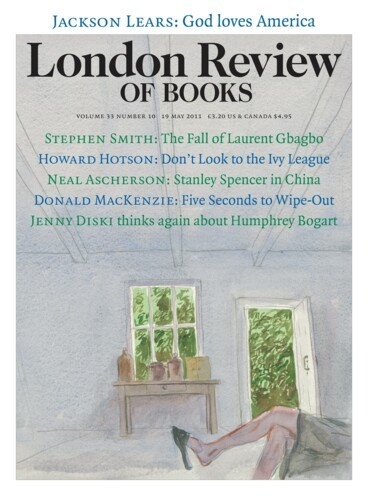Peter Brooks
Peter Brooks teaches comparative literature at Yale. His most recent book, Body Work, was reviewed here by Terry Eagleton.
The pleasure of not being there
Peter Brooks, 18 November 1993
Benjamin Constant was a Swiss Protestant patrician and a cosmopolitan, but many episodes of his life fall somewhere between soap opera and boulevard farce. For instance on 5 June 1808, the 41-year-old Constant married Charlotte von Hardenberg (her second marriage had been annulled, his first had ended in divorce), but married her secretly, then took extraordinary precautions to prevent anyone knowing he was married, living apart and visiting Charlotte only clandestinely. The problem was Germaine de Staël, with whom Constant had been locked in a tempestuous on-again, off-again affair for some 12 years. How to tell the grand lady of Coppet what he had done – and how to stage manage the scene that was bound to ensue? He spent most of the summer of 1808 visiting Madame de Staël in Coppet – where she held court during her banishment from Paris by Napoleon – but never summoned up the courage to break the news. Come the next spring, another try. In May 1809, Constant and Charlotte travelled to the vicinity of Coppet, Constant lodging in Ferney while Charlotte took a room in the inn at Sécheron. Charlotte sent a note, signed ‘Charlotte Constant de Hardenberg’ to de Staël, who promptly ordered her carriage and confronted Charlotte in her bedroom that very evening – and stayed until four in the morning.
Pieces about Peter Brooks in the LRB
What’s your story?
Terry Eagleton, 16 February 2023
If you can carve your own path to the grave these days, it is because grand narratives have crumbled and can no longer constrain you. Journeys are no longer communal but self-tailored, more like hitchhiking...
Qui s’accuse, s’excuse: in confessional mode
Terry Eagleton, 1 June 2000
In the wake of the Second Vatican Council, some progressively minded Catholics began to reintroduce into the Mass the ancient practice of public confession. Individuals would rise from their pews...
It is not quite true that I have a body, and not quite true that I am one either
Terry Eagleton, 27 May 1993
There will soon be more bodies in contemporary criticism than on the fields of Waterloo. Mangled members, tormented torsos, bodies emblazoned or incarcerated, disciplined or desirous: it is...
Read anywhere with the London Review of Books app, available now from the App Store for Apple devices, Google Play for Android devices and Amazon for your Kindle Fire.
Sign up to our newsletter
For highlights from the latest issue, our archive and the blog, as well as news, events and exclusive promotions.


